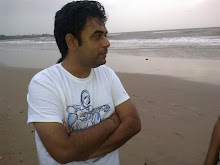
Devdas is Bollywood’s most decorated lover. The reason for him being an inspiration for most of the directors is I guess not his loss, but his tendency for self-destruction. A story that exceeds the height of tragedy is likely to become stuff of legend. Bhansali’s larger-than-life portrayal of Devdas was aesthetic excellence, but Anurag Kashyap imagines that had Sarat Chandra Chattopadhyay written Devdas in today’s time, the reason for Dev’s demise would have been libidinal drives and arrogance, and not social differences. Above all, Kashyap succeeds in capturing the isolation of Devdas.
Apart from being a bleaker version among all the previous attempts to capture Devdas on celluloid, Dev D is a wonderful movie-going experience; more so because being Indian we don’t much get to see thought provoking cinema …ok, let me leave intellectual hunger of certain cinemagoers aside… we don’t even get a new experience (and we get either feminist or cliché-ridden patriotic films in the name of serious cinema). Film-making in Bollywood is just packaging. They make products these days, and not movies. Because one love-story is just a reinvented cliché from another mind-numbing film, there are many surprises in Dev D for an Indian viewer. The relationships between the characters filled with anger, egoism, sexual drives gives a very different facet of lovers, far from the image of lovers Bollywood has created (not that all relationships are meant to be fractured, but this was believable) something which reminded me of Faith Akin’s Head-on. Screen characters in Hindi films are becoming one-dimensional, shallow, and artificial – more desperate to flaunt their well-toned bodies in designer outfits than showing genuine humanness; and when they fall in love and sing those high-budget songs, they look like they are still advertising (maybe because of corporate funding). So Dev D comes as a breath of fresh air just like Dil Chahta Hai came few years ago. We like such films for their honesty. By honest, I don’t mean that a film should portray love in all its tragic incarnations, but the situations should at least submit to the character’s becoming. For instance, there came a film called Laaga Chunari Mein Daag in which Rani Mukerji enters deeper into the gritty world of prostitution, and in the end to give a stereotypical happy ending a prince charming enters her life and tells her that he cannot live without her. It must have disappointed a real prostitute sitting in the cinema-hall watching the film because she knows to her guts that prince charming exists only in fairy tales.
Anyways, the structure of Dev D explains the transformation of the three leads in episodes. Among many funny sequences of the film, the trumpet band that received Dev on his return to India and followed him behind his car akin to Emir Kusturica’s Once Upon A Time There Was A Country was amusing to watch. Dev’s crude relationship with his father showed in initial scenes opened a window to his psyche for the viewer to later understand his fall. Going by previous films of Kashyap who is known for dark films devoid of any melodrama, I don’t think he wants the viewer to sympathize for Devdas like Bhansali did. I think he is just observing Dev’s demise and expects the viewer to do the same. After being in the world of drug-induced hallucination, when Dev experiences a near-death experience: that is the first time we see him awake – an epiphany, maybe! It is through Chanda that the torn-apart Dev learns to come to terms with reality; not because she is an angel, but because he starts showing readiness (off course, she is always there whenever Dev needs her despite having her own demons to mend). In fact, Dev D is the most positive version of Devdas ever filmed as it allows Dev to resurrect. And finally, the best moment in the film was “Emotional Atyachar”! The song is performed in such an unrehearsed, matter-of-fact manner that it made everyone laugh out loud in the cinema hall, and it was meant to show the departure of Dev from his known reality.
Though a little uneven at some places, Dev D is finely made, and it is his first script since Satya and Kaun? that I liked. I didn’t like No smoking. It was a nice try to capture the disorientation of the protagonist through surrealism, something which very few have done before in Hindi films. Some scenes were really inventive and amusing, but it still had something missing. I don’t know what because I am not a film student. I guess you have to be David Lynch at the height of your powers to capture the essence of Kafka. I am not comparing them; I am just suggesting that it was Kashyap’s first attempt at something which Lynch has mastered so well in decades of surrealist filmmaking (best example being Mulholland Dr.).
Maybe in time we will see Kashyap giving us a breath-taking kafkaesque mindbender...
